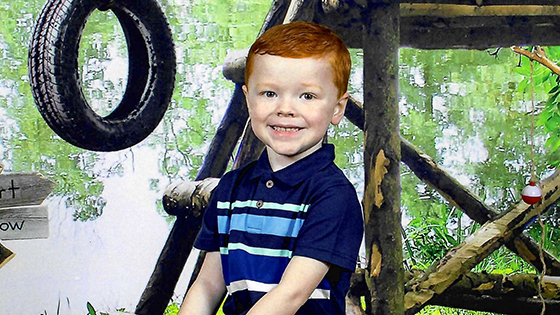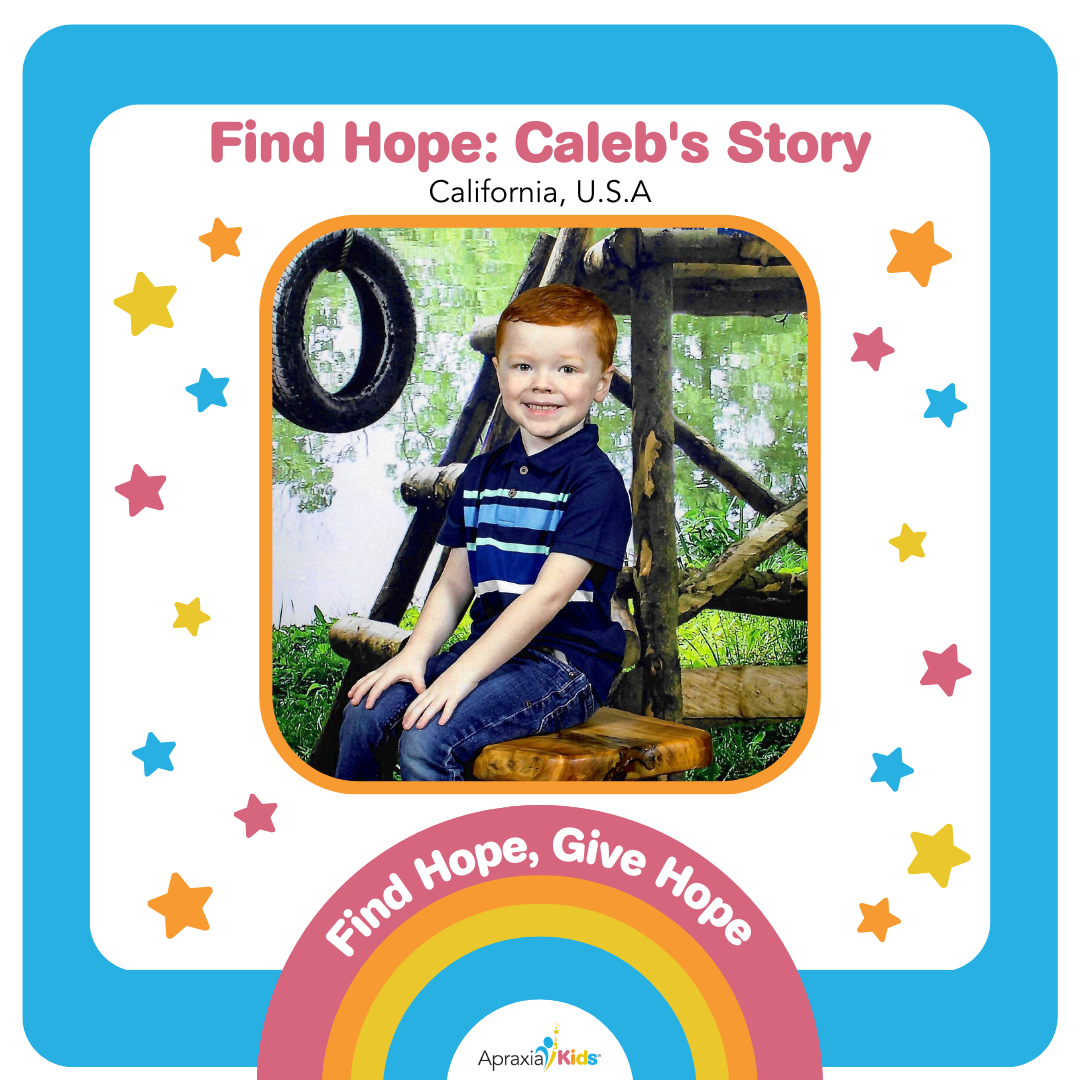
25 Apr Caleb’s Apraxia Journey – Written by his Mom

Caleb is my second child, and I knew he should be making more sounds and babbling. I asked the pediatrician for a speech referral, and we were referred at 18 months. Caleb began speech therapy and a local special education program for children under 3. Since he had so few sounds it did take a while for him to be officially diagnosed with Apraxia by his speech therapist. The official diagnosis came close to his 3rd birthday. We knew this was probably going to be the case, so we were not shocked. We actually felt a little relieved that finally we had a real name for what he was dealing with.
Our biggest struggles have been just not being able to help him or give him what he needs or wants at the time of him requesting it. There have been lots of meltdowns and tantrums and many, many tears, from us all. I think the hardest time was the first time he basically figured out that we couldn’t understand what he wanted, and he just sort of gave up and basically said “never mind.” It was heartbreaking to see his defeat, even more so than the anger and frustration. He looked so defeated.
Caleb has always been a very friendly, personable, outgoing little guy. He is always working so hard in his speech sessions and classes. His greatest accomplishments are just how hard he continues to work and to fight to get his words out. He is also learning that there are other ways to say things that may be too hard, so he will rephrase things to be better understood. In speech he never gives up even when it is difficult, he continues to try. I know that this will make him able to succeed in anything he puts his mind to in the future.
The beginning of our journey was very difficult, I often felt like I had somehow failed him. That I was an awful parent since I couldn’t even understand my own child. I felt alone on the journey, until I was able to meet other parents that also had a child with Apraxia. In the beginning it felt like such a heavy load to carry, the idea that your child may not ever be able to communicate in a way that others could understand, but as the sounds began to come, I started to feel like it would all work out. Caleb started with sign language which greatly reduced his frustrations. As the words began to come, the signs were dropped and he just used words. It IS hard and it does take LOTS of work on the whole family’s part, but the thing we have learned is to try to stay positive and take each day as it comes. Now Caleb is 5 years old and he is in an amazing AAC preschool program and is thriving. He mainly uses spoken words to communicate and is mostly understood by others. There are still times when communication is hard, but overall, Caleb has made HUGE strides in his language.
Caleb still is going to a Special Ed/ Inclusion Preschool program, and he still goes to one-on-one speech therapy once a week. There are days where the words are harder to find than others and there are still frustrations in communication, however, if you were to look back on our lives even a year ago it was very different. Caleb has really blossomed in the last year for sure. There are still times in public where he might not be fully understood, where I need to help the person listening, depending on the situation. Overall, Apraxia is part of our lives, but a smaller part each and every day.
Early Intervention is KEY and finding the right/trained SLP will have an enormous effect on the results you see in therapy. It is important that your child likes the therapist and can work with them. If it doesn’t feel right, if your child doesn’t enjoy going or the therapist seems frustrated or not interested, it’s not the right fit…move on. You are the only one who truly knows your child – be their advocate, be their voice, and fight for all the services they deserve. Join an Apraxia support group, even if just online, because having that support from other families is so comforting. You and your child are NOT alone.
Be inspired by more stories today and learn about how you can Give Hope!
Visit, FIND HOPE, GIVE HOPE

Caleb is my second child, and I knew he should be making more sounds and babbling. I asked the pediatrician for a speech referral, and we were referred at 18 months. Caleb began speech therapy and a local special education program for children under 3. Since he had so few sounds it did take a while for him to be officially diagnosed with Apraxia by his speech therapist. The official diagnosis came close to his 3rd birthday. We knew this was probably going to be the case, so we were not shocked. We actually felt a little relieved that finally we had a real name for what he was dealing with.
Our biggest struggles have been just not being able to help him or give him what he needs or wants at the time of him requesting it. There have been lots of meltdowns and tantrums and many, many tears, from us all. I think the hardest time was the first time he basically figured out that we couldn’t understand what he wanted, and he just sort of gave up and basically said “never mind.” It was heartbreaking to see his defeat, even more so than the anger and frustration. He looked so defeated.
Caleb has always been a very friendly, personable, outgoing little guy. He is always working so hard in his speech sessions and classes. His greatest accomplishments are just how hard he continues to work and to fight to get his words out. He is also learning that there are other ways to say things that may be too hard, so he will rephrase things to be better understood. In speech he never gives up even when it is difficult, he continues to try. I know that this will make him able to succeed in anything he puts his mind to in the future.
The beginning of our journey was very difficult, I often felt like I had somehow failed him. That I was an awful parent since I couldn’t even understand my own child. I felt alone on the journey, until I was able to meet other parents that also had a child with Apraxia. In the beginning it felt like such a heavy load to carry, the idea that your child may not ever be able to communicate in a way that others could understand, but as the sounds began to come, I started to feel like it would all work out. Caleb started with sign language which greatly reduced his frustrations. As the words began to come, the signs were dropped and he just used words. It IS hard and it does take LOTS of work on the whole family’s part, but the thing we have learned is to try to stay positive and take each day as it comes. Now Caleb is 5 years old and he is in an amazing AAC preschool program and is thriving. He mainly uses spoken words to communicate and is mostly understood by others. There are still times when communication is hard, but overall, Caleb has made HUGE strides in his language.
Caleb still is going to a Special Ed/ Inclusion Preschool program, and he still goes to one-on-one speech therapy once a week. There are days where the words are harder to find than others and there are still frustrations in communication, however, if you were to look back on our lives even a year ago it was very different. Caleb has really blossomed in the last year for sure. There are still times in public where he might not be fully understood, where I need to help the person listening, depending on the situation. Overall, Apraxia is part of our lives, but a smaller part each and every day.
Early Intervention is KEY and finding the right/trained SLP will have an enormous effect on the results you see in therapy. It is important that your child likes the therapist and can work with them. If it doesn’t feel right, if your child doesn’t enjoy going or the therapist seems frustrated or not interested, it’s not the right fit…move on. You are the only one who truly knows your child – be their advocate, be their voice, and fight for all the services they deserve. Join an Apraxia support group, even if just online, because having that support from other families is so comforting. You and your child are NOT alone.
Be inspired by more stories today and learn about how you can Give Hope!
Visit, FIND HOPE, GIVE HOPE
Credentials:
Hours of Operation:
Treatment locations:
Address:
,
Phone:
Email:
Overall Treatment Approach:
Percent of CAS cases:
Parent Involvement:
Community Involvement:
Professional consultation/collaboration:
Min Age Treated:
Max Age Treated:
Insurance Accepted:




